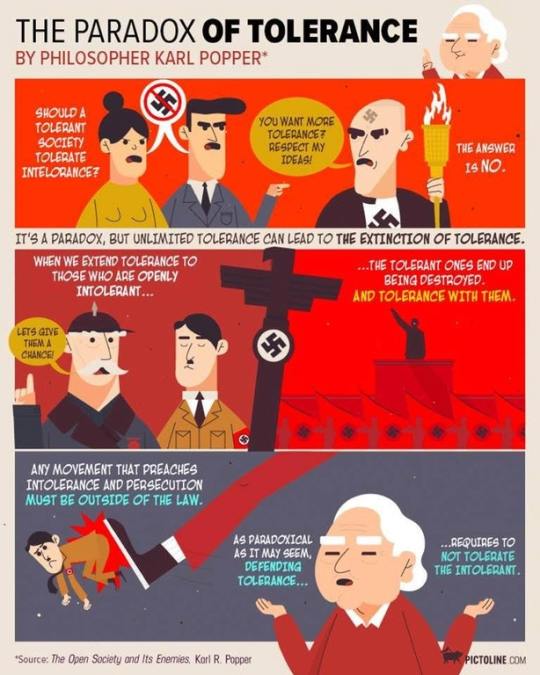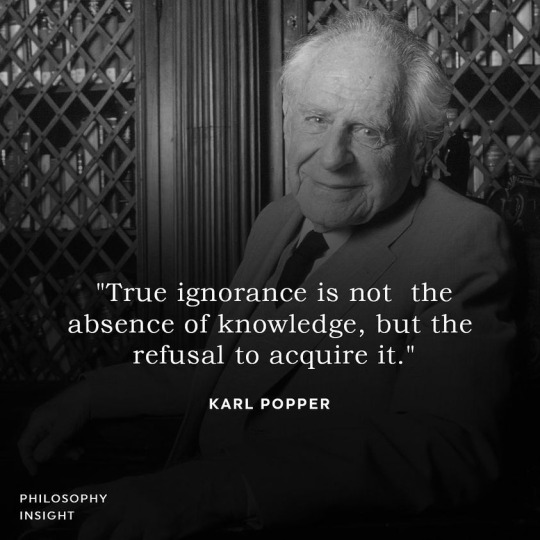#karl popper
Text
True scientists look for evidence to disprove their hypotheses, but pseudoscience looks for evidence to support it.
Karl Popper
51 notes
·
View notes
Text
Incomplete screenshots of this excellent Twitter thread about tolerance from July 2017 are doing the rounds on Facebook, so here's the link to the full version:

Continued:

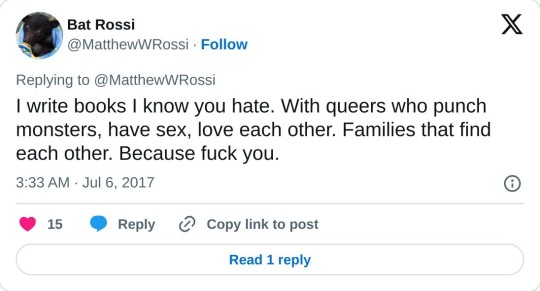
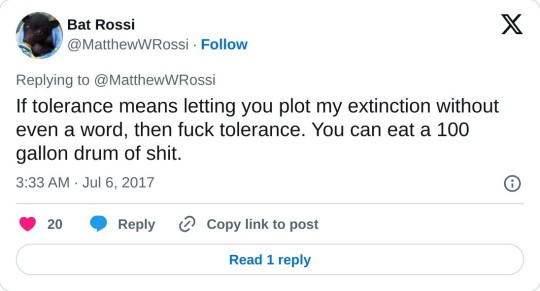


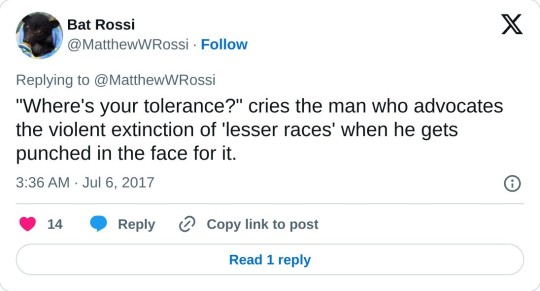

I was only able to find the author's books on Amazon, so do let me know if there's another link I've missed (also I haven't read them yet, to be fair):
#rant#matthew rossi#the nameless#author#queer author#twitter#karl popper#tolerance#intolerance#the intolerance of intolerance#you don't owe unrepentant bigots charity or tolerance#bigotry#twitter thread
25 notes
·
View notes
Note
I picked up the funny Kuhn book on your rec, and noticed Karl Popper on the same shelf, framing himself in contrast. Do you have/know of any good critiques on Popper in general, or his indeterminism in particular? I'm guessing he didn't convince every Marxist and someone's bound to have responded by now.
yea popper sucks. i mean kuhn himself was responding to / critiquing popper; they very famously had a long ongoing dispute. but like i said before, kuhn is also not where it's at imo. like, not that academic citations are the be-all end-all of intellectual value, but there are reasons you don't typically see either of these guys cited by people working in history / philosophy of science these days lol.
anyway in regards to the marxism angle of this i will say: a major problem with hist/philsci is that these disciplines are pretty ensconced in universities (conservative institutionally & intellectually) and have also taken a long time to even start looking beyond the horizons of great man history, the 'western canon', &c. so the lack of marxists / communists in these fields is like, even more pronounced than in academic history more broadly. like it's insane that people like bob young and roger cooter and adrian desmond are still, like, standouts in this respect lol. so, although there are many many marxists who have responded to popper on those terms, and many many historians and philosophers of science who have responded on that side, the sliver of overlap here is a lot smaller than it should be.
i would definitely read with a critical eye and be on the lookout for places where these texts fail specifically because their authors are not engaging in materialist or properly historicised analysis, or are just blatantly reactionary themselves, in different ways to popper. but, a few places to start with political histsci and philsci critiques of him, or just useful accounts of his legacy and critics:
The Cambridge Companion to Popper (2016). Jeremy Shearmur and Geoffrey Stokes (eds.). <-usual disclaimer that cambridge edited vols. are methodologically, politically, and epistemologically playing it VERY safe. you often want to read them 'backwards', ie, read for what's not being said as much as for what's actually in there. consider this a document that shows what sorts of debates are being permitted, centred, and accepted as 'mainstream' and 'reasonable'.
Epistemological Battles on the Home Front: Early Neoliberals at War against the Social Relations of Science Movement (2021). Beddeleem, Martin. Journal of the History of Ideas Volume: 82 Issue: 4 Pages: 615-636. 10.1353/jhi.2021.0035
Relations between Karl Popper and Michael Polanyi (2011). Jacobs, Struan & Mullins, Phil. Studies in History and Philosophy of Science Volume: 42 Pages: 426--435.
Thoughts on political sources of Karl Popper's philosophy of science (1999). Jacobs, Struan. Journal of Philosophical Research Volume: 24 Pages: 445-457
Popper and His Popular Critics: Thomas Kuhn, Paul Feyerabend and Imre Lakatos (2014). Agassi, Joseph. ISBN: 3319065866
Science and Politics in the Philosophy of Science: Popper, Kuhn, and Polanyi (2010). Mary Jo Nye. Chapter in: Epple, Moritz & Zittel, Claus (2010) Science as Cultural Practice. ISBN: 9783050044071
Karl Popper, the Vienna Circle, and Red Vienna (1998). Hacohen, Malachi Haim. Journal of the History of Ideas Volume: 59 Pages: 711-734.
Science, politics and social practice: Essays on Marxism and science, philosophy of culture and the social sciences in honor of Robert S. Cohen (1995) Gavroglu, Kostas; Stachel, John J.; & Wartofsky, Marx W. (Eds.). <-haven't read the popper chapter in this, can't promise it's good
34 notes
·
View notes
Text
Unlimited tolerance must lead to the disappearance of tolerance...
"Unlimited tolerance must lead to the disappearance of tolerance. If we extend unlimited tolerance even to those who are intolerant, if we are not prepared to defend a tolerant society against the onslaught of the intolerant, then the tolerant will be destroyed, and tolerance with them. [.] We should therefore claim, in the name of tolerance, the right not to tolerate the intolerant." -Karl R. Popper
Popper's paradox is based on the idea that tolerance is a two-way street. In order for tolerance to exist, it must be extended to everyone, including those who are intolerant. However, if the intolerant are allowed to express their intolerance without challenge, they will eventually become powerful enough to destroy tolerance altogether.
#philosophy#quotes#karl popper#morality#values#liberalism#responsibility#culture#historia#histoire#history#food#friends#family
31 notes
·
View notes
Text
Im Namen der Toleranz sollten wir uns das Recht vorbehalten, die Intoleranz nicht zu tolerieren.
In the name of tolerance, we should reserve the right not to tolerate intolerance.
Karl Popper (1902 – 1994), Austrian-British philosopher
73 notes
·
View notes
Text

CIVANTICISM
Wisdom ֎ Truth ֎ Balance ֍ Virtue ֎ Empathy
https://www.civanticism.com/
10 notes
·
View notes
Text
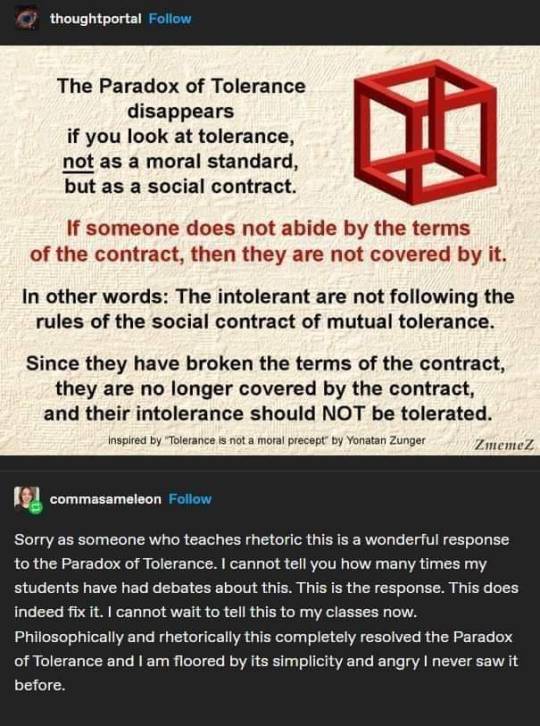
The Paradox of Tolerance rethought
36 notes
·
View notes
Text
True ignorance is not the absence of knowledge, but the refusal to acquire it.
Karl Popper
#karl popper#popper#quotes#philosophy#wisdom#life#literature#writer#books#write#psychology#ignorance#idea#ideas#art#artist
14 notes
·
View notes
Text
Free Speech in Germany
As German police crack down on pro-Palestinian protesters and activists, I can't help but remember a meme that circulated a few years ago which heavily paraphrased philosopher Karl Popper's "paradox of tolerance" to justify silencing hateful speech (shown below). The upshot of this "paradox" is that intolerant views cannot be tolerated because, eventually, they will be able to institute their opposition to tolerance, and the logic of an open society will break down. At the time, liberals and some leftists on the internet were enthusiastic about censorship as the answer to everything from racism to right-wing domestic terrorism, with the reality of Germany's Volksverhetzung laws banning various forms of hate-speech held up as exemplars of such protections against harmful speech and protectors of the kind of "tolerance" referenced in the Popper meme. Those leftists who participated in this internet "discourse" on hate-speech should consider today's reality of anti-genocide activists being arrested and beaten for criticizing the State of Israel which, in Germany, is basically immune from criticism on pain of accusations of Holocaust denial. The internet's abstract theorizing about censorship against the right has unsurprisingly evolved into a concrete reality of suppression of the left, and more importantly of the victims of Western-backed genocide.
The essential questions to ask in response to this old meme are "what qualifies as intolerance?" and "who decides?", points which conveniently escaped attention when the goal was to silence right-wing opponents and restore the soul of America. A key German example of the potentially egregiously broad interpretation of intolerance-which-need-not-be-tolerated is the woman arrested in Berlin for writing "from the river to the sea" on social media. She, her phone, and all her computers were dragged out of her home because of a single instance of political speech, an obvious injustice, but perhaps more importantly for certain cynical leftists who don't value free speech in itself, a strategic and practical threat to the left's political goals. It turns out the answers to my questions are "whatever isn't in the interests of the state" and "the state"; that is to say, the power to police "intolerance" is a power which can only ever really be held by the very capitalist state the left opposes so heartily. The liberals who wanted to lock up Nazis in America can look on with satisfaction, confident that the state they love so well is now stemming the flow of hatred and intolerance, but leftists are now forced to reckon with their ideologically-motivated capitulation to the very forces which they usually seek to confront and destroy.
Free speech has, at a minimum, an important instrumental value to those of us living under the auspices of the most powerful and depraved empire ever to exist. The one lever of power we still have firm control of, at least in places like the United States where free speech is meaningfully protected, is the ability to speak truth to power, unfettered by vacuous accusations of "hate" or "treason". Even if one isn't a dissident, when the speech of the dissident is suppressed, your ability to read what he has to say is as well. It's not just the freedom to speak, but the freedom to hear, which is restricted by laws like these. More significantly however, free speech has a immeasurably deeper moral value to creatures like us whose defining feature is language and thought: the sustenance of our very humanity. The more our speech is restricted, and the more the use of our rational faculties is hemmed in by law and ideology, the less we are able to reach our real potential as human beings through journalism, criticism, fiction, and poetry. To limit speech is to castrate the human mind, to sterilize human history, and to relegate individual human beings to the status of machines made out of flesh. The Greek philosopher Arcesilaus once said that cocks may be made capons, but never capons into cocks. Let's hope that the poor German capons might prove him wrong.

3 notes
·
View notes
Photo
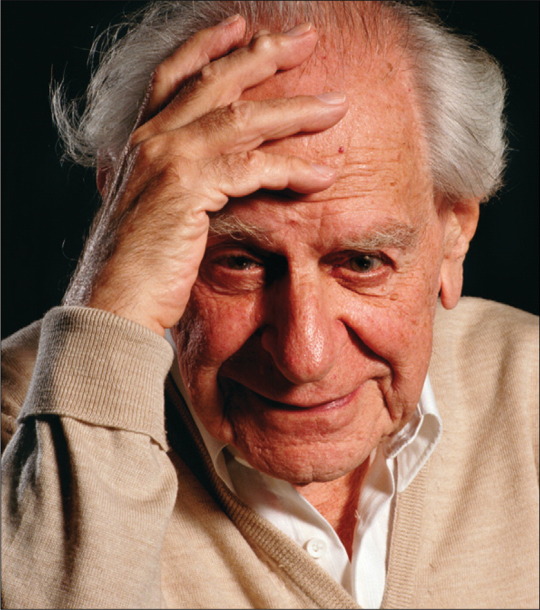
Why do all these social philosophies support the revolt against civilization? And what is the secret of their popularity? Why do they attract and seduce so many intellectuals? I am inclined to think that the reason is that they give expression to a deepfelt dissatisfaction with a world which does not, and cannot, live up to our moral ideals and to our dreams of perfection. The tendency of historicism (and of related views) to support the revolt against civilization may be due to the fact that historicism itself is, largely, a reaction against the strain of our civilization and its demand for personal responsibility.
- Karl Popper, The Open Society and Its Enemies - Vol 1: The Spell of Plato
#popper#karl popper#quote#philosophy#open society#civilisation#philosopher#society#perfection#abrogation of responsibility#historicism
66 notes
·
View notes
Photo

“The history of science, like the history of all human ideas, is a history of irresponsible dreams, of obstinacy, and of error. But science is one of the very few human activities - perhaps the only one - in which errors are systematically criticized and fairly often, in time, corrected. This is why we can say that, in science, we often learn from our mistakes, and why we can speak clearly and sensibly about making progress there.”
-- Karl Popper
#Karl Popper#science#what science is#scientific errors#falsifiability#religion is a mental illness#criticism of ideas
43 notes
·
View notes
Text
Wer's nicht einfach und klar sagen kann, der soll schweigen und weiterarbeiten, bis er's klar sagen kann.
If you can't say it simply and clearly, you should keep quiet and keep working until you can say it clearly.
Karl Popper (1902 – 1994), Austrian-British philosopher
46 notes
·
View notes
Quote
La consapevolezza non inizia con la cognizione o con la raccolta di dati o fatti, ma con i dilemmi.
Karl Popper
30 notes
·
View notes

